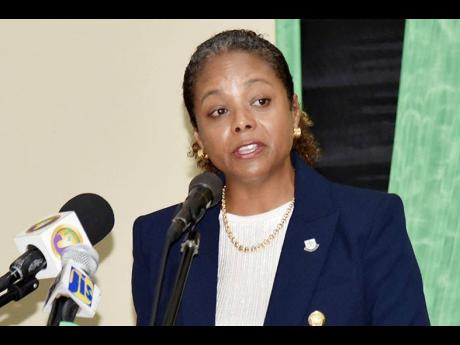Malahoo Forte: I wish some people didn’t know their rights more than wrongs
Crime culling civil liberties, minister laments
Jamaica’s crime rate presents an impediment to citizens fully benefiting from rights guaranteed under the Universal Declaration of Human Rights (UDHR), Marlene Malahoo Forte has asserted.
The minister of legal and constitutional affairs made the statement on Monday during a panel discussion in recognition of the 75th International Human Rights Day, which was celebrated on Sunday.
“The rights that are guaranteed cannot be enjoyed in a context where violence is used to settle disputes, where murder is used to settle a score,” she said.
The event commemorated the promulgation of the UDHR, a treaty which outlines the basic principles of human rights which include the right to life, liberty, free speech and privacy. The event was organised by the Office of the Public Defender.
“We need to understand that guaranteeing rights on paper is not the same as ensuring that it be truly enjoyable,” Malahoo Forte said.
The latest police crime statistics indicate that for the period January 1 to December 2, 2023, the country recorded 1,282 murders – a 10.2 per cent reduction year on year. For the corresponding period in 2022, Jamaica recorded 1,428 murders.
CRIME RATE: A ‘REAL PROBLEM’
Stating that the country’s crime rate has been a“real problem” for the Holness administration, the minister expressed disapproval with “law-abiding Jamaicans”, who she said she wishes would “let their voices be heard against the criminal elements in the same way that they often let their voices heard when they raise concerns about the criminal elements”.
Malahoo Forte also emphasised the responsibility that citizens have in guarding each others’ rights.
“The Constitution also places a responsibility on every person in Jamaica to ensure that the guaranteed rights can be enjoyed. And I think this is where you sometimes find great tension in the society because the duty that is under the state to guarantee the right, there is also to protect those rights, and the State has to take action when the conduct of another person threatens the enjoyment of rights by others,” she said.
“But right beside your right is your responsibility to your fellowman, it doesn’t matter what is guaranteed. You can’t enjoy it, if those who are charged with securing it, protecting it are irresponsible, and that includes the State,” she added.
She sought to assure that the Government has been making progress in addressing issues around persons in state custody, while maintaining that the right to due process is non-negotiable.
AN ABUSE OF POWER
The Government’s consistent use of state of emergency as a crime-fighting measure, which grants the police and military the ability to search, seize, arrest citizens without a warrant and detain them indefinitely has been criticised by civil society groups as an abuse of power, and an infringement on the rights of citizens.
“Any action that you see that may be of concern to you taken by the Government of Jamaica in a contested space is action taken to ensure that Jamaicans, all Jamaica can ensure the rights that are guaranteed, not some at the expense of others,” Malahoo Forte said.
The minister also shared that the Government is embarking on an intra-government legal education initiative to ensure that all persons who work in the Government understand the approach that has to be taken in the functions of office.
“In spite of our challenges here on the island, we are still better off than many other places,” she said. “Jamaica is unmistakably a free and democratic society. I just wish that some people didn’t know their rights more than their wrongs.”
Meanwhile, EU Ambassador Marianne Van Steen highlighted the importance of advocacy from civil society groups in human rights.
“You need to have that civil society… that is in contact with the people, and that makes sure that those rights, if not yet existing, that they are being approved and adopted,” she said. “I really think every single country in the world…Europe and Jamaica and Latin America, everywhere in the world view civil society as an advocate for human rights is extremely important.”
Equally significant, Dennis Zulu, United Nations resident coordinator for Jamaica stated, is for the populace to be knowledgeable of their human rights.
“How many people actually know their human rights, how many people actually hold (the) Government accountable for the rights that they actually have? The right to housing, the right to education, the right to seek trial and all those rights,” he said.

